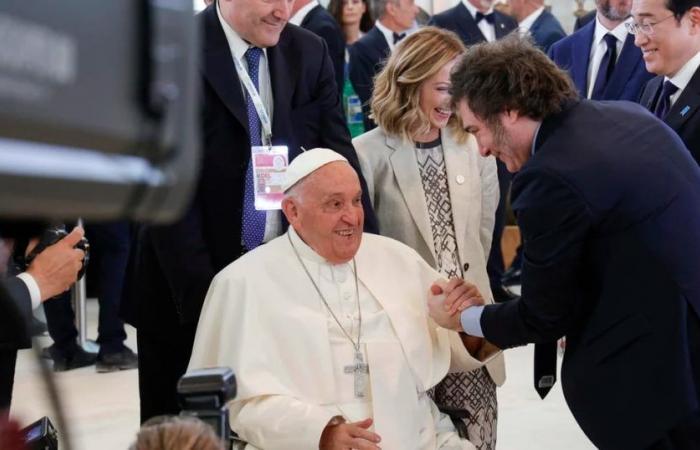“Pope Francis He has a vision of things that is directly opposite to the one I have.”. Javier Milei With these words he defined his relationship with the Supreme Pontiff, which had been tense during last year’s election campaign, but which changed to cordial after the President’s visit to the Vatican in February.
Milei’s statements come in a context where the relationship between the national government and the Church is going through a moment of tension due to the questions raised by ecclesiastical sectors regarding the economic and social policy of the libertarian leader.
Asked by journalist Antonio Laje, on LN+, about the qualification of Francisco as “representative of evil on earth”, the Head of State said: “I made a mistake. Even if you have a different vision, that did not warrant me saying the qualifiers I used.”
Furthermore, he explained the differences between the two: “They have to do with his way of seeing (things), he sees them from the perspective of a Jesuit.” A few minutes before, he had said that he was not going to proceed in the same way, with an apologyregarding the differences he maintains with the presidents of Brazil, Lula da Silvaand from Spain, Pedro Sanchez.
“Deep down, (Pope Francis) was saying something for having a different view of the Holy Scriptures. He doesn’t have to buy my argument from Samuel 8 and my argument about Saint Luke,” he explained.
“I fell into the trap of believing that it was because he was a Peronist. But that was my mistake, that’s why I answered the way I answered. And when I went back and forth on the subject of the Holy Scriptures, I understood it. “On some things we have the same vision and on others we don’t,” he expressed to separate political distances from those that have to do with strictly religious matters.
After the meeting at the Vatican in February, the president of the Episcopal Conference, Monsignor Oscar Ojeahe had described in an interview with Infobae the difficult social situation faced by the poorest sectors of Argentina and the lack of responses that he noticed from the Executive.
“In some dining rooms in greater Buenos Aires, where there were 50 people, now there are more than 100,” he said on that occasion and added that “to get the bread to the neighborhoods it is necessary not to discontinue the existing groups that are working. Anything that prevents primary goods, such as food, from reaching our people is not good. This is the specific way in which they are currently reaching the people”, in direct allusion to the problems in the distribution of food that the Government had with the soup kitchens.
The food issue, which was handled by the Human Capital Ministry headed by Sandra Pettovello, was one of the issues that the Church questioned. Some masses were also added in parishes in the City of Buenos Aires and Greater Buenos Aires, in which chants against Milei were heard. In one of them, in the San Cristóbal neighborhood, where Monsignor Gustavo Carraravicar general and auxiliary bishop of Buenos Aires, the The Church had to come out and apologize.
On June 19, in Ciudad Evita, La Matanza, Ojea led a mass “in recognition of the women who support the soup kitchens in our neighborhoods.” And in line with several of Pope Francis’ guidelines, on Wednesday of this week in the town of Quilmes, in the south of Buenos Aires, there were new demands from the bishops regarding the issue of food, the replenishment of the fund for works in the neighborhoods (FISU ) and preventive programs.


